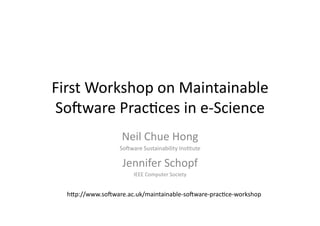
Maintainable Software Practices for e-Science - Introduction to Workshop
- 1. First Workshop on Maintainable So3ware Prac7ces in e-‐Science Neil Chue Hong So3ware Sustainability Ins7tute Jennifer Schopf IEEE Computer Society hDp://www.so3ware.ac.uk/maintainable-‐so3ware-‐prac7ce-‐workshop
- 2. Published online 13 October 2010 | Nature 467, 775-‐777 (2010) doi:10.1038/467775a
- 3. Stopping errors before they maDer • Errors unchecked in code cause retrac7ons • Chang – Protein Structure – Error in data analysis code flipped two columns of inver7ng electron density map – Science 22 December 2006: Vol. 314 no. 5807 pp. 1856-‐1857 DOI: 10.1126/science. 314.5807.1856 • Bertoia – Hypertension – Error in code led to doubling of sample size and significantly different es7mates – Hypertension. 2012;60:e29, published online before print August 6 2012, doi: 10.1161/HYP.0b013e318269bc7a
- 4. Ensuring so3ware is maintained • OU Knowledge Network – All funding stopped a3er 8 years, with 11,000 ac7ve users – s7ll available • Atmospheric Model – Upgrades to hardware meant so3ware did not run – took effort to address So3ware Preserva7on Benefits Framework: hDp://www.so3ware.ac.uk/aDach/So3warePreserva7onBenefitsFramework.pdf
- 5. A typical e-‐Science project organisa7on? Steering Group InvesJgators Project Managers 10 partners Researchers Developers Students
- 6. Topics of Interest • So3ware engineering and so3ware product management best prac7ce as applied to e-‐Science and computa7onal science • Community development, collabora7ve development, and widening adop7on • Licensing, funding, and business models for eScience and research so3ware • Managing governance and organisa7onal change during the so3ware lifecycle • Measuring and analysing the impact of so3ware and so3ware processes • So3ware aDribu7on, cita7on, and credit • Interac7on between researchers, developers and stakeholders • Transferable so3ware prac7ces from industry
- 7. Agenda – morning Communi7es and Prac7ces • 09:00 Introduc7on to the Workshop • 09:30 Sustainable So3ware for Computa7onal Chemistry and Materials Modeling • 10:00 Break • 10:30 Adop7on of So3ware by a User Community: The Montage Image Mosaic Engine Example • 11:00 On Realizing the Concept Study ScienceSo3 of the European Middleware Ini7a7ve -‐ OpenSo3ware for Open Science • 11:30 The Rela7onship Between Development Problems and Use of So3ware Engineering Prac7ces in Computa7onal Science • 12:00 Lunch
- 8. Agenda – a3ernoon Models and Methods • 13:30 libHPC: So3ware sustainability and reuse through metadata preserva7on • 14:00 Overview of the TriBITS Lifecycle Model • 14:30 IPOL: Reviewed Publica7on and Public Tes7ng of Research So3ware Debate introduc7on • 15:00 Break • 15:30 Culture Change debate: "What can we do to change the status quo? Should we do this?” • 17:00 Close
- 9. Area of Interest from Audience • Prac7ces and models • Mixed industry/academic projects • Portability across heterogeneous • Integra7on of so3ware plalorms components • Ways of reducing complexity • Sustaining so3ware on liDle • Recording informa7on on money so3ware structure • So3ware engineering applied to • Making so3ware verifiable computa7onal science • Building communi7es around • Is there a life beyond public so3ware funding (e.g. for dCache)? • Cultural issues in organisa7ons • So3ware + data preserva7on for • Collabora7on between 10 years usage (e.g. Tevatron) ins7tu7ons and countries • Taking responsibility for orphaned • Meta-‐issues of so3ware across so3ware (e.g. for OSG) science and social science • Understanding what so3ware’s been funded and what’s happened to it?
- 10. Culture Change Discussion • Goals – Understand what are the key barriers to culture change with respect to so3ware in research – Understand who and what needs to change, to change the status quo – Record the studies, examples, prac7ces and models that the workshop par7cipants agree should be highlighted
- 11. Ques7ons 1 What are the basic so3ware skills and understanding every scien7st needs? – Beverly Sanders et al. 2 Life beyond public grant funding – what happens next? – Bruce Berriman, Michael McLennan, Jennifer Schopf, Nigel Ward, Jim Willenbring 3 So3ware reward, cita7on, aDribu7on. Tracking usage and impact – Neil Chue Hong, Alberto Di Meglio, Josh Greenberg, Juan Lalinde, Kevin Jorissen
- 12. Process • Brainstorm issues and ideas (45 mins, around break) – Put down ideas without judgement (it doesn’t maDer if someone else doesn’t think it’ll work) – If you’ve heard of something, write it down • Understand and group (15 mins) – Do you have the same understanding of all the ideas – Are some of the ideas linked • Priori7se and record (30 mins) – What are the biggest issues? – What are the ideas that you’ve seen that (don’t) work best? – Are there trends/correla7ons that should be explored? • Share your findings (15 mins) • Please record digitally so that it can be easily shared